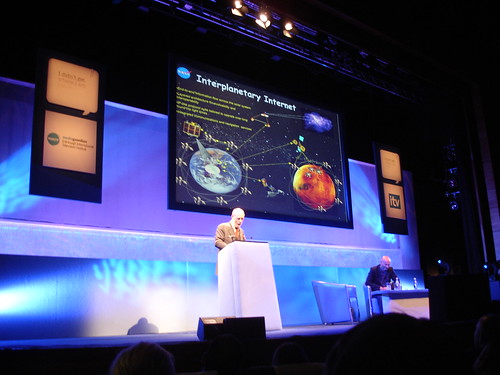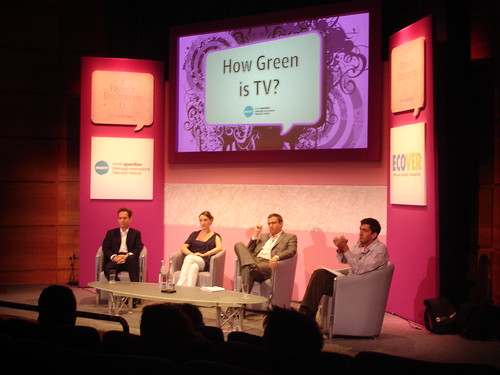« Death of a Sysadmin | Main | Cinea to no longer power BAFTA screeners »
September 06, 2007
Edinburgh TV Festival
I caught a bit of the Edinburgh TV Festival a few weeks back. Three sessions stood out.
The keynote address was by Jeremy Paxman. I didn't hear his speech but its worth a read for an insider's view on the BBC and TV in general. His biggest gripe - that there doesn't appear to be a vision for TV going forward alongside other platforms.
Vint Cerf gave an interesting talk on the future of the Internet and touched on Interplanetary Network protocols being worked on with NASA. "The distances are astronomical!". Having Google's Chief Internet Evangelist on the bill was a good sign that new media is inescapable. If you came to the event without any knowledge of the Internet industry however, you could be forgiven for thinking that any Internet entrepreneur is rolling in dough. "Making squillions" was a phrase being bandied about, conveniently omitting the fact that the space is bigger than Google/Amazon/Yahoo/eBay/Joost etc. The suggestion that programme makers may still have to cough up for their 360 degree cross channel universe, rather than cadging favours from the big guns, is still obviously a bit hard to swallow.
"How Green Is TV?" was the compelling title of the final session I went to. It was less of a panel event than a slanging match between Martin Durkin and senior BBC Current Affairs staff in the audience over the issue of how to represent climate change in the media. I was struck by the fact that ecologically unsound processes within the media industry was barely touched upon, apart from an admission from the BBC that the corporation could be doing more. The whole debate was typical TV Industry - all about which egos and viewpoints should be getting more airtime.
Given the coverage the debate received in the press the next day (e.g. in The Guardian), I wasn't surprised by the announcement today that plans for a specially televised "Planet Relief" day of programming have been scrapped. Accusations that the BBC has an overtly liberal bias are not new. What is new is how climate change research is now most visible as a political tool to be used for other agendas than the environment. In the past, only the most committed ecologically-minded individuals paid the debate much heed.
Posted by .M. at September 6, 2007 03:12 PM
Trackback Pings
TrackBack URL for this entry:
http://thequality.com/mt/mt-tb.cgi/593

